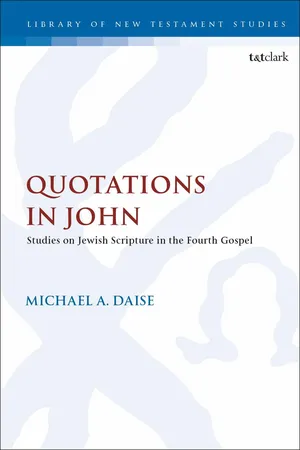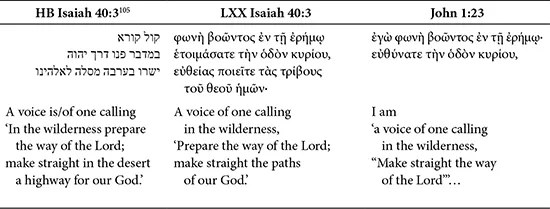![]()
Part I
ISAIAH, JESUS AND THE JEWS
![]()
Chapter 1
ISAIAH 40:3, A CALL TO BELIEVE
A. Quotations of Isaiah and Jesus’s public ministry
Three quotations in John are the only ones explicitly ascribed to Isaiah. The first is the citation of Isaiah 40:3 at John 1:23, where, responding to queries about his identity, John replies, ‘I am “a voice of one calling in the wilderness, ‘Make straight the way of the Lord’”, as Isaiah the prophet said.’98 The second and third are the quotations of Isaiah 53:1 at John 12:38 and Isaiah 6:10 at John 12:40, both cited by the evangelist to interpret the Jews’ unbelief at the end of Jesus’s public ministry:
But though he had done so many signs before them,
they were not believing in him,
that the word of Isaiah the prophet might be fulfilled, which he said,
‘Lord, who has believed our report?
And to whom has the arm of the Lord been revealed’?
For this reason they were not able to believe,
for again Isaiah said,
‘He has blinded their eyes
and hardened their heart,
lest they see with the eyes
and discern with the heart,
and turn, and I heal them.’99
The evangelist closes these last two quotations by tying them to Isaiah’s vision of divine glory in Isaiah 6, the same chapter from which the second of the citations was drawn: ‘These things Isaiah said, because (or when) he saw his glory and spoke about him.’100
These quotations form an inclusio to chapters 1–12 which unfolds as a commentary on the Jews’ responsibility and response to Jesus’s public ministry; and in this chapter and the next (Part I) they will be engaged with a view towards offering alternate hypotheses to the exegetical problems they raise and teasing out the theological import of this literary structure which they create: John 1:23/Isaiah 40:3 in the present chapter; John 12:38/Isaiah 53:1 and John 12:40/Isaiah 6:10 in Chapter 2. The endeavour will conclude that, as an inclusio, these quotations bring closure to the Book of Signs by unfolding as (1) a call to believe in Jesus, (2) a lament that no one had and (3) a disclosure that the insight needed to do so had been cosmically obstructed.
B. The Johannine rendering of Isaiah 40:3 (John 1:23)
The quotation of Isaiah 40:3 at John 1:23 is placed in the mouth of John the Baptist and functions as the obliging part of his answer to a query about his identity. The passage in which it occurs is labelled ‘the testimony of John’,101 and it turns on questions put to him by priests and Levites sent from Jerusalem by the Jews – particularly, the Pharisees. When they first ask him ‘Who are you’?, John replies thrice in the negative. He denies he is the Christ and successively answers ‘no’ to further suggestions that he is Elijah or ‘the prophet’. When they ask him again who he is, if not these three, he holds forth by ‘making’ Isaiah 40:3ab ‘his own’ (zu eigen macht)102:
He (John) said,
‘I am “a voice of one calling in the wilderness,
‘Make straight the way of the Lord’”,
as Isaiah the prophet said.’103
1. The text
The HB, LXX and Johannine renderings of this verse are shown in Table 5.104
Table 5 Isaiah 40:3 in the HB, LXX and John
2. The version cited
The version cited is almost certainly the LXX. The LXX, itself, diverges from the HB in one, possibly two, respects; and, save for the verb εὐθύνατε, John’s rendering follows suit: like the LXX, it reads ‘Lord’ (κύριος) for the tetragrammaton; and, if the ambiguous
was intended as a predication (‘a voice calls’), the Fourth Gospel, like the LXX, takes those words instead as a genitive construct – φωνὴ βοῶντος, ‘a voice of one calling’. A Hebrew
Vorlage could (and to some extent has) be(en) argued on two grounds: that since Aquila independently translated
as a genitive construct (albeit with different vocabulary – φωνὴ καλοῦντος), so might the evangelist have done; and that since εὐθύνατε can plausibly be explained as a translation of
in HB Isaiah 40:3c,
106 the rest of the lines quoted could similarly be explained as a translation of HB Isaiah 40:3ab.
107 Following the guiding assumption used here, however, neither of these prospects (nor their combination) marshal a case compelling enough to offset the verbal agreement that occurs between John 1:23 and the LXX, and this leaves it more probable that the evangelist has re-presented the Greek rather than translated the Hebrew.
The case for a LXX source has been pressed further by Schuchard and Menken, but on premises that are open to question. Schuchard argues on the grounds of syntax and original context: (a) like LXX Isaiah 40:3 (over against the HB), he contends, the evangelist adjoins the phrase ‘in the wilderness’ to the phrase ‘a voice of one calling’ (syntax)108; and, (b) echoing LXX Isaiah 40:2 (over against its HB counterpart), the evangelist depicts priests hearing (and presumably reporting) John’s salvific declaration of Isaiah 40:3 to Jerusalem (context)109 – that is to say, Schuchard argues that if the pericope surrounding the quotation echoes LXX Isaiah 40, the quotation, itself, is likely drawn from that same version.110 Both of these premises, however, have been rightly questioned by Menken, who observes (a) that since John does not cite Isaiah 40:3c – which could better indicate the syntax of ‘in the wilderness’ – the role of that phrase at John 1:23 is uncertain111; and (b) that had the evangelist wished to portray the priests in John 1 on the basis of LXX Isaiah 40:2, he would not have included Levites along with them: ‘And this is the testimony of John, when the Jews from Jerusalem sent priests and Levites to ask him, “Who are you”’?112
Menken’s own case for a LXX (or, as he entertains, pre-Aquilan
113) source turns on vocabulary – specifically (as noted above), the verb βοᾶν in John’s rendering
of the verse. Since that verb is a
hapax legomenon to Johannine literature, he contends, and since John elsewhere expresses ‘calling’ with the verbs κράζειν
114 or κραυγάζειν,
115 βοᾶν is more likely to have been imported from the LXX than to have been used as a gloss for
.
116 As argued above, however, Menken’s approach to this matter labours under several difficulties
117: specifically for this quotation, (1) he fails to note that the verb in the quotation which he does ascribe to the evangelist (εὐθύνειν) is also a
hapax legomenon to Johannine literature; (2) he elsewhere declines to read
hapax legomena as indicators of a LXX source
118; (3) his inferences about the evangelist’s preference for κράζειν or κραυγάζειν overreach the (relatively meagre) data available on Johannine parlance
119; and (4) he does not consider that, like other terms he lists as more probable translation choices for the evangelist, βοᾶν, itself, was generously used as a LXX gloss for
(and, so, could furnish an apt option for the evangelist’s own rendering of the Hebrew).
A LXX source for the quotation may perhaps increase the likelihood that the verse was brokered by the Synoptic gospels, which likewise cite the passage.120 Partly supporting Synoptic agency is that like the Fourth Gospel, they too ascribe the verse explicitly to Isaiah: in Mark, ‘As it is written in Isaiah the prophet’; in Matthew, ‘For this is that which was spoken through Isaiah the prophet, saying …’; and in Luke, ‘As it is written in the book of the words of Isaiah the prophet’.121 Added to this, however, is that, even more evidently than John, the Synoptics draw the verse from...






